Exploring the Bible Commentary | EB (16 vols.)
Digital Logos Edition
Overview
What is the relevance of the obscure regulations found in Deuteronomy? Why is God silent in the book of Esther? What is God’s plan for both Jews and Gentiles? How can I live a Christian life despite today’s daily pressures? What is the message of Revelation? Explore the Bible like never before, and discover the answers to these and other important questions. The 16-volume Exploring the Bible Commentary collection offers accessible and easy-to-read commentaries on New and Old Testament books. You’ll find verse-by-verse analyses, introductions to biblical history and context, and overviews of important themes and events.
Written by scholars and vetted by pastors, the Exploring the Bible Commentary collection takes an in-depth look at the wilderness journeys of the Israelites, the challenges faced by Esther, the life and ministry of Old Testament prophets, and more. The authors wrestle with hard questions and navigate through difficult issues, with a keen eye toward application and relevance for today. Their accessibility, combined with their comprehensive scope, makes these commentaries perfect for individual or group study. The Exploring the Bible Commentary collection is valuable for readers seeking an introduction to difficult texts and for those looking to expand their knowledge of the Bible.

- Features an introduction to the author of each biblical book covered
- Provides a chronological history of events
- Offers examples and illustrations
- Includes guides for further reading and study
I continue to be thankful for the publications of Day One. They are biblical; they have sound theology; and they are relative to the issues at hand. The material is condensed and manageable while, at the same time, being complete—challenging balance to find. We are happy in our ministry to make use of these excellent publications.
—John MacArthur, pastor-teacher, Grace Community Church, CA
- Title: Exploring the Bible Commentary Collection
- Series: Exploring the Bible Commentary
- Publisher: Day One
- Volumes: 16
- Pages: 2,949
Individual Titles
- Deuteronomy: An Expositional Commentary by Paul E. Brown
- Joshua: A Devotional Commentary by Colin Peckham
- Ruth: A Devotional Commentary by Iain D. Campbell
- Exploring Ezra: The Secret of Spiritual Success by Kieran Beville
- Exploring Esther: Serving the Unseen God by Colin D. Jones
- Why Lord? The Book of Job for Today by Gary Benfold
- From Despair to Hope: Insights into the Book of Job by Peter Williams
- Nahum and Obadiah: An Expositional Commentary by Tim Shenton
- Obadiah: A Practical Commentary by David Field
- Jonah: Running from God: An Expositional Commentary by Peter Williams
- Habakkuk: An Expositional Commentary by Tim Shenton
- Haggai: An Expositional Commentary by Tim Shenton
- Acts: Church on the Move: An Expositional Commentary by Peter Williams
- Philippians for Today: Priorities from Prison by Gerard Chrispin
- 1 and 2 Thessalonians: A Practical Commentary by Stanley Jebb
- Revelation Revealed: The Book of Revelation for Today by Gary Benfold
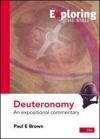
Deuteronomy can seem rather formidable at first sight, but it is actually one of the most important books in the Old Testament. It consists almost entirely of words spoken by Moses to the people of Israel as they camp in the plains of Moab next to the river Jordan with the Promised Land awaiting them on the opposite bank. These are God’s people, whom he has taken into covenant with himself. Moses urges them to go forward by faith into the land that God has set before them. He tells them God’s laws and commandments for their new life in the land, weaving his instructions around the principles enshrined in the Ten Commandments.
In this commentary, Paul Brown demonstrates the sometimes surprising relevance of the regulations of Deuteronomy for the churches and the lives of Christian people today. But such relevance is only to be expected, for God is always the same and his Word, rightly understood, is profitable to lead us to his grace and to guide us in our living.
Paul Brown reliably steers the reader through the often-alien landscape of Deuteronomy with clarity and level-headedness. His application to the Christian life, in the Reformed tradition of exegesis, is judicious, never fanciful, and pastorally helpful. There is material here to aid both private study and Bible teaching.
—David Green, lecturer in Hebrew, London Theological Seminary
Paul E. Brown lives near Lancaster, England. He retired after 42 years in pastoral ministry: first in Southampton (as an assistant pastor), and then in Stoke-on-Trent and Dunstable. For many years he contributed to and edited Go Teach and Grace Magazine. He has authored several books, most recently editing Homosexuality: Christian Truth and Love. He studied at the colleges now named the London School of Theology and Wales Evangelical School of Theology.
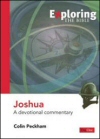
Joshua—what a book! It is a necessary bridge between the Law of Moses and the rest of Israel’s history, and it magnifies the faithfulness and power of God. Joshua is a very important book in the canon of Scripture, and this devotional commentary merits attention. It provides challenging and penetrating insights into Scripture. That in essence is its objective—to confront men and women with the necessity of integrity, purity, and victory through obedience and faith.
If you are looking for a fast-moving, down-to-earth, and challenging insight into Joshua, then this is it. Colin Peckham presents a grasp of the book that is easy to take in—particularly the long historical chapters—and manages at the same time to show how the book’s message is just as vital for today as it has always been.
—A. M. Roger, principal, Faith Mission Bible College, Edinburgh
An interesting combination of Bible reading and devotional. There are 21 chapters, 17 of which deal with the text either as a full or part chapter of the book of Joshua. I wouldn’t normally sit and read a commentary for fun, but this one I found really interesting, insightful, and thought-provoking. And it is easy to read, too.
—Clem Jackson, The Christian Marketplace
Colin Neil Peckham (LTh, BA, BTh, MTh, DTh) was born in South Africa where he had 10 years of evangelistic ministry and youth work before working at a Bible college in Cape Town for 13 years. He then immigrated to Great Britain and for 17 years was principal of the Faith Mission Bible College in Edinburgh, Scotland. As principal emeritus he now has an extensive preaching ministry in Britain and abroad and has authored several books.
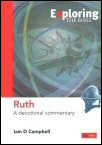
The Book of Ruth is not the longest of the books of the Bible—it contains only four chapters of text. Yet its significance is immense. Ruth was a young woman from Moab, who came to be part of the covenant community of God’s people. Consequently, she is one of only a handful of women mentioned in the genealogy of Christ: she begins as a stranger to God’s people, and ends up as a mother of God’s Messiah.
This remarkable story is both an example and an illustration of how sinners like us can become partakers of God’s covenant salvation. In Ruth’s story, God’s grace worked in her life, bringing her from a place where she was far away from God, into an inheritance of covenant blessing. And just as she found her rest and satisfaction in her marriage to her redeemer, Boaz, so we find ours through union with the great Redeemer, the Lord Jesus Christ. Read the story of Ruth—and let the power of God’s amazing grace grip your soul!
Iain Campbell demonstrates in a masterful way that the story of Ruth is the Old Testament in miniature. Another useful commentary that should be found in our bookcase—after it has been thoroughly enjoyed.
—Grapevine
This little volume manages to combine the depth of a theologian, the clarity of a true expositor, the wisdom of a pastor, and the warmth of an evangelist in a way that belies its size. Iain D. Campbell opens up Ruth in a manner that makes it accessible and stimulating for readers from almost any background. Most of all, he shows us the gospel in the romance of Ruth and leads us to the greatest romance of all: our romance with Jesus!
—Mark Johnston, Grove Chapel, Camberwell
This book gets to the very heart of the book of Ruth. . . . The gospel in the book of Ruth comes alive through the pages of this book, providing the church of Christ with a much-needed resource for believers of all ages who desire to more fully know the height and depth of the love of Christ. . . . This book rouses our hearts and lifts our eyes to look upon the faithful and loyal love of God for us his people.
—Burk Parsons, editor, Tabletalk magazine
Iain D. Campbell is the pastor of a church on the Isle of Lewis. He trained for the ministry at the University of Glasgow and at the Free Church College Edinburgh. Campbell is author of several other books published by Day One: On the First Day of the Week: God, the Christian and the Sabbath, The Gospel according to Ruth, Opening up Exodus, Opening up Matthew’s Gospel, and Seven Wonders of the World.
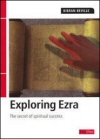
Exploring Ezra challenges the complacency of contemporary Christian culture and calls for greater commitment to Christ’s commission. Creative in its presentation of solid Christian truths, Exploring Ezra shows the Old Testament book in a new light.
It is infused with a pastoral passion to see the truth of God’s Word understood and applied. As such, it is a book that helps to foster Christian growth and godliness. It traces the homecoming journey of God’s people, from bondage to blessing, under the leadership of one of Israel’s greatest historical heroes.
It treats a diverse range of biblical and theological themes (including the sovereignty of God, the authority of Scripture and the centrality of preaching) in a fresh and forthright manner with a voice that is both authentic and authoritative. Reverent in handling Scripture, readable in style, and relevant in its message, this book is a thought-provoking, vivid work which establishes the author as a standard-bearer for the relevance of the ancient text in the contemporary context. The study questions make it a practical ministry tool for pastors, teachers, and church members who desire to go a little deeper.
Kieran Beville graduated from University College Cork with a BA and post-graduate diploma in education. Subsequently, he taught English, history, communications, and media studies before taking up a post in educational management. With a further diploma in Christian studies from Westminster College, Oxford, he completed his theological training in Bryntirion, South Wales. He has been the pastor of Westside Baptist Church in Bandon, Co. Cork, Ireland, since 1998.
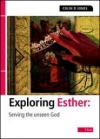
The study of the providence of God is both exciting and profitable: it thrills our hearts as we see the wisdom and power of our Heavenly Father; it strengthens our resolve as we marvel at the sufficiency of his grace; and it brings comfort when we do not understand what is happening to us or around us. Esther is all about that marvelous providence. Studying it can deepen our trust, enrich our worship, and intensify our love for God. It will reassure us that though we may not always see him, he never loses sight of us. The history of Esther is one of the clearest examples of Paul’s great assertion in Romans 8:28: “We know that in all things God works for the good of those who love him.”
Very few modern commentaries on the Book of Esther manage to combine a high view of God’s providence and the historicity of the narrative with serious exposition and masses of warm, practical application. This one does.
—Jonathan Stephen, director, Affinity
Colin D. Jones has been in the ministry since 1971. He became the pastor of Three Bridges Free Church, Crawley, in 1996 after 22 years of ministry at Wem Baptist Church, Shropshire. He is a long-serving member of the Council of the FIEC.
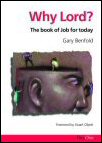
Gary Benfold skillfully guides us through the book of Job’s main themes with brilliant summaries and teaching from elsewhere in Scripture. Concrete examples and varied illustrations drive the lessons home.
Gary Benfold has made the book of Job light reading while maintaining its deep truth.
—J. Alec Motyer, former principal, Trinity College, Bristol
Gary Benfold is the minister of Moordown Baptist Church in Bournemouth, England, and has a passion for explaining the good news about Jesus in a clear and jargon-free manner. He is the author of Reach Out for Him: Knowing the Unknown God.

Author Peter Williams accepts that Job was a historical figure who faced up to real problems about his own suffering, about God’s justice and government, and about the malignancy of evil in the world. Job is probably one of the world’s oldest books and certainly not the easiest to understand, but it conveys some very powerful lessons for today. The author believes that we would greatly benefit by learning from this great man something of the meaning of victory over personal affliction, and the triumph of true faith in Almighty God.
The main feature of the book is its God-centered perspective. There is not a chapter which fails to point our eyes to the majesty of heaven. The author’s use of illustration and application is a model of true exposition.
—Evangelicals Now
Peter Williams is a Welshman from the town of Neath in South Wales. He is a graduate of the University of Wales and has degrees in theology and philosophy. He has served churches in England and Wales and has continued a preaching ministry since his retirement in 1997, now exercising oversight at Southbourne Evangelical Church in Bournemouth, England. He is the author of several other books also published by Day One, including Opening Up 2 Timothy and Opening Up Ezra.
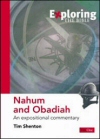
Approximately one hundred years after Jonah preached to the citizens of Nineveh to turn “from their evil ways” and escape imminent judgment, God commissioned Nahum to prophesy the city’s complete destruction. At the time, the Assyrian Empire was both strong and wealthy, yet Nahum prophesied that soon the entire kingdom would be crushed forever under the power of God’s wrath.
Obadiah’s prophecy unveils God’s sovereignty over all nations and events, and gives an example of his direct intervention in the political and military affairs of human history. The Sovereign Lord does as he pleases with the powers of heaven and the peoples of the earth. No one can hold back his hand or say to him: “What have you done?”
Both prophecies are a revelation of God’s character and his moral government of the world—a revelation that contains a message of hope, comfort, and encouragement. It matters not how many nations oppose his rule or oppress his people; it makes no difference how many spiritual forces of evil ally themselves for his dethronement, for the Lord’s purposes will prevail. All that he has promised will be fulfilled. He is in control. His dominion is an eternal dominion.
Tim Shenton takes us to the most neglected of the Old Testament prophecies, Nahum and Obadiah, and gives us a clear verse-by-verse explanation. . . . This is a book that provides both understanding of difficult books and comfort for difficult times—and that certainly makes it well-worth reading!
—Roger Ellsworth, pastor, Parkview Baptist Church, Jackson, TN
Tim Shenton is the head teacher of St. Martin’s School and an elder at Lansdowne Baptist Church, Bournemouth. He has researched and written extensively on church history, specializing in the eighteenth and nineteenth centuries. Among his published works are Forgotten Heroes of Revival, Our Perfect God, and Opening Up 1 Thessalonians (part of the Opening Up Commentary Collection).
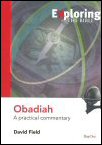
It is said that “the best things come in small packages” and certainly the book of Obadiah bears that out. Weighing in at just 21 verses, it is packed full of good things: rich theology, powerful imagery, unsettling challenges to our thinking and living, and huge promise for the triumph of God’s purposes. Obadiah uses key biblical themes such as mountains and brothers, the kingdom of God and the day of the Lord; he challenges his hearers and readers by what he says about malice, pride and complacency; he encourages God’s people with the promise of their sure inheritance; and he raises wider matters of justice, spiritual warfare, and the international spread of the kingdom of God. Furthermore, like all the prophets, Obadiah over and over points us to the kindness and justice of the Lord Jesus Christ and to the greatness of what he has done for us.
[David Field] writes with a passion for Jesus Christ and God’s coming kingdom that draws the reader to worship.
—John Tindall, associate pastor, Monyhull Church, Kings Norton, Birmingham
Obadiah, like many short books, is densely packed with the truths of God. In this book—in equal measure scholarly and pastoral—David Field does wonderful work in unpacking those truths and showing their relevance for Christians today.
—Doug Wilson, pastor, Christ Church, Moscow, ID
David Field lectures at Oak Hill Theological College in London and is a member of Enfield Evangelical Free Church. After reading theology at Oxford, David taught in a theological college in Nigeria for three years and then gained a PhD from Cambridge on the thought of English Puritan, John Howe. He was pastor of Horsley Evangelical Church for five years and immediately before beginning teaching at Oak Hill he had four years in the commercial world as a headhunter.
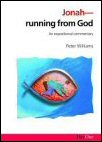
Although Jonah was a prophet, the book named after him is not a prophecy, but a biographical narrative involving his prophetic mission to the Ninevites. Peter Williams began writing this book with less than a high opinion of Jonah, but his view changed as the writing process continued. Starting from the basis that this was a historical—not fictional—account, the author discovered Jonah to be an honest person, prepared to put down in writing his own faults and prejudices so that we might learn from them. The real importance of this little biblical book is its place in God’s plan to embrace both Jew and gentile in his saving purpose, culminating in the gospel of the Lord Jesus Christ.
Peter Williams is a Welshman from the town of Neath in South Wales. He is a graduate of the University of Wales and has degrees in theology and philosophy. He has served churches in England and Wales and has continued a preaching ministry since his retirement in 1997, now exercising oversight at Southbourne Evangelical Church in Bournemouth, England. He is the author of several other books also published by Day One, including Opening Up 2 Timothy and Opening Up Ezra.
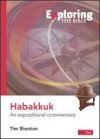
Why does a righteous and sovereign God tolerate wrongdoing? How are the divine attributes reconciled with the triumph of the godless? Why do the wicked prosper and rule over the righteous? Why does God raise up ruthless and impetuous nations to execute judgment on his own people? These are some of the questions that perplexed Habakkuk, challenged his faith, and caused him to question God’s government of the world. And these are some of the questions that still perplex Christians today. Tim Shenton helpfully addresses these points in a clear and substantial exposition of the text of Habakkuk.
Tim Shenton has provided us with a very helpful commentary on the writings of this man of God. Careful and clear, it is an excellent aid for every believer who would know and love the Lord. Take it and read. And then, bow before the Lord in worship.
—James Renihan, dean, Institute of Reformed Baptist Studies, Westminster Seminary, Escondido, CA
Tim Shenton is the head teacher of St. Martin’s School and an elder at Lansdowne Baptist Church, Bournemouth. He has researched and written extensively on church history, specializing in the eighteenth and nineteenth centuries. Among his published works are Forgotten Heroes of Revival, Our Perfect God, and Opening Up 1 Thessalonians (part of the Opening Up Commentary Collection).
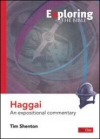
As in the days of Haggai, excuses for apathy are shamelessly voiced, blind eyes are turned to the judgments of God, and defiled hearts sink into unfaithfulness. And yet the Lord Almighty remains faithful to his people and true to his word. Through repeated trials he calls the backslider to repentance, with timely encouragements and gracious promises he strengthens the downhearted, and for his own glory he transforms the sins of neglect and ignorance into the servants of his purpose. With urgency, the prophet condemns the wickedness of waiting, when duty calls today, and of lamenting the past—desiring an experience today similar to that of yesterday. And he warns of the grave peril of expecting immediate material results. It is a message that must be taken seriously by the twenty-first century church.
The book of Haggai presents a powerful challenge and provides great encouragement for the church in the twenty-first century. Tim Shenton’s lucid exposition of this dynamic book gets to the heart of the prophet’s message by carefully explaining and skillfully applying the text. Although this is a short commentary, the author’s meticulous research has enabled him to enlighten us with invaluable background information which will sharpen our understanding of its urgency and passion.
—Simon J. Robinson, senior pastor, Walton Evangelical Church, Chesterfield, England
This commentary is easy-to-read and accurate, offering useful practical applications. Avoiding complicated vocabulary, it meets the need of those who want a concise breakdown of the prophecy. The analysis is excellent.
—Peter Naylor, retired Baptist minister
Tim Shenton is the head teacher of St. Martin’s School and an elder at Lansdowne Baptist Church, Bournemouth. He has researched and written extensively on church history, specializing in the eighteenth and nineteenth centuries. Among his published works are Forgotten Heroes of Revival, Our Perfect God, and Opening Up 1 Thessalonians (part of the Opening Up Commentary Collection).
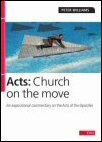
The early church really was a church on the move. It was dynamic and exhilarating and there really was a sense of things happening. There were, undoubtedly, dangerous and challenging times for the early Christians, but they were exciting times as God’s Holy Spirit was at work amongst the leaders and the ordinary people. While we may look back with longing to such days, God has called us to serve him with the gospel of his grace in our own day, and we may do so with the help of such instruction as is to be found in this book.
Simply, clearly, and readably written, this is a superb ‘telling of the story’ of Acts.
—Evangelicals Now
Peter Williams is a Welshman from the town of Neath in South Wales. He is a graduate of the University of Wales and has degrees in theology and philosophy. He has served churches in England and Wales and has continued a preaching ministry since his retirement in 1997, now exercising oversight at Southbourne Evangelical Church in Bournemouth, England. He is the author of several other books also published by Day One, including Opening Up 2 Timothy and Opening Up Ezra.

This book is a thorough devotional and discipleship commentary. The author, an experienced prison evangelist, provides a stimulating and heart-warming explanation of the message of Philippians, and, in the process, exposes the reader to a considerable breadth and depth of Bible teaching through an extensive cross referencing to many other parts of Scripture. This is a book about Christ, about the gospel, and about living a consistent Christian life notwithstanding the daily pressures of modern society. With the material divided into easily manageable sections, there is also a series of mini-overviews, several points of application, and, at the end of the book, a number of questions which may be used for personal study, group discussion, church or fellowship Bible studies, or one-on-one discipleship training.
. . . a very thorough and practical exposition of Philippians.
—Philip Hacking, retired Anglican minister, Christ Church Fulwood, Sheffield
A former criminal lawyer and manager, Gerard Chrispin is a Bible teacher and evangelist. He is an associate evangelist of Young Life, an itinerant pastor with the Fellowship of Independent Evangelical Churches, and former chairman of both United Beach Missions and its European subsidiary, Missions Vacances. He has authored several books, including The Bible Panorama.
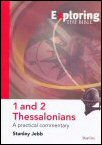
How relevant is 1 and 2 Thessalonians for Christians today? These are letters written over 2,000 years ago and which are among Paul’s earliest writings—can they be relevant? In this thorough, yet easy-to-read commentary, Stanley Jebb reveals their timeless pastoral and practical application. We see Paul’s deep concern for believers and find important instructions about how we should live—instructions which are as relevant today as they were when they first written. We also learn about the events that will take place at the second coming of Jesus Christ. Read this book and discover just how applicable these letters are to your church and to your daily life.
Dr. Jebb’s unfailing pastoral touch means that even some of the most difficult passages in the New Testament are handled with freshness and simplicity. . . . Concise yet profound, the exposition sidesteps no problem.
—Graham Harrison, former lecturer, London Theological Seminary
This volume combines flawless exposition with far-reaching application . . . a highly readable commentary. . . . I unreservedly recommend this work.
—Tony Sargent, emeritus principle, International Christian College, Glasgow
Stanley Jebb has pastored Baptist churches for 42 years. He holds a BA in theology from Bristol University, BD from London University, a PGCE from The London Institute of Education, and a ThD from Trinity Theological Seminary.
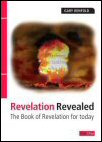
C. H. Spurgeon once professed profound ignorance of the meaning of Revelation and said “Only fools and madmen are positive in their interpretations.” Yet Gary Benfold argues that Revelation is one of the easiest books in the New Testament to understand—if we will simply step back and look for the main message! Here he helps us to do just this in this thrilling and fast-moving look at the most famous visions ever recorded.
Here is exposition that is both sane and spiritually uplifting, a reliable and uncompromising guide through difficult terrain.
—Jonathan Stephen, director, Affinity
Gary Benfold is the minister of Moordown Baptist Church in Bournemouth, England, and has a passion for explaining the good news about Jesus in a clear and jargon-free manner. He is the author of Reach Out for Him: Knowing the Unknown God.